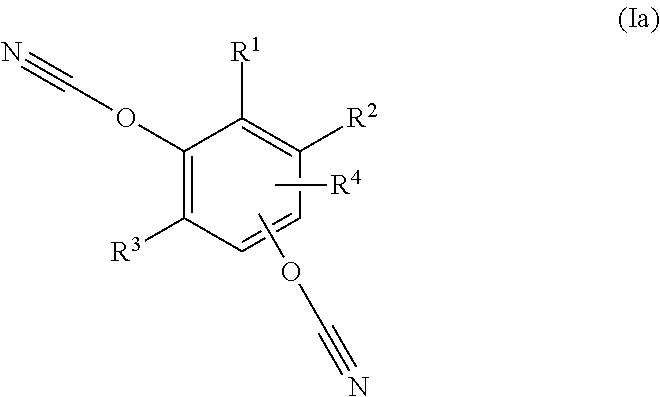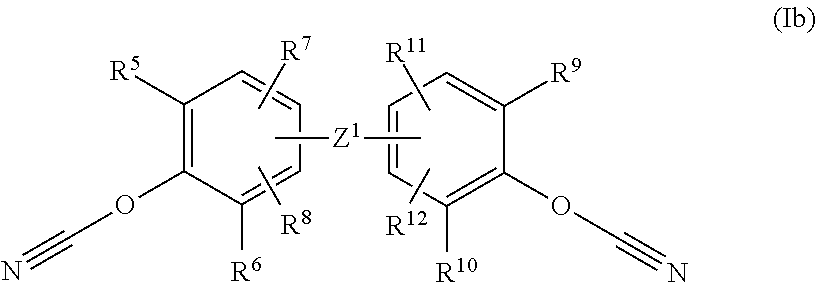Method for Preparing Fiber-Reinforced Parts Based on Cyanate Ester/Epoxy Blends
a technology of cyanate ester and fiber reinforcement, which is applied in the direction of coatings, etc., can solve the problems of decreasing the interlaminar shear strength (ilss) value of epoxy-based cfrp molds, and achieves high temperature resistance, high viscosity, and high temperature resistance.
- Summary
- Abstract
- Description
- Claims
- Application Information
AI Technical Summary
Benefits of technology
Problems solved by technology
Method used
Image
Examples
example 1
[0091]The formulation was a mix of cyanate ester Primaset™ PT-30 (formula Ic, R14═R15═H, n=3-4) and bisphenol A epoxy resin (formula IIb, Q3=Q4=O, R20═R21═R22═R23═R24═R25═R26═R27═H, Z2═—C(CH3)2—, glycidyloxy moieties in para position to Z2). The liquid amine Lonzacure™ DETDA80 (formula IIIa, R31═CH3, R32═R33═C2H5, R34═R35═H, isomeric mixture of about 80% 3,5-diethyltoluene-2,4-diamine and about 20% 3,5-diethyltoluene-2,6-diamine) was used as catalyst.
[0092]A mixture of 12.80 g (41 wt. %) of Primaset™ PT-30 and 18.10 g (59 wt. %) of bisphenol A diglycidyl ether epoxy resin GY240 (Huntsman) was prepared. The viscosity of the resin system is shown in Table 1 below:
TABLE 1Viscosity of Primaset ™ PT-30 (41 wt. %) / Bisphenol A (59 wt. %)Temperature [° C.]Viscosity [mPa × s]40325050100060400801001003712018
[0093]The viscosity of the liquid catalyst amine Lonzacure™ DETDA80 is very low as shown in Table 2 below.
TABLE 2Viscosity of Lonzacure ™ DETDA80Temperature [° C.]Viscosity [mPa × s]251763...
example 2
[0100]The formulation was a mix of cyanate ester Primaset™ PT-15 (formula Ic, R14═R15═H, n=2-3) and bisphenol A diglycidyl ether epoxy resin. The liquid amine Lonzacure™ DETDA80 was used as catalyst.
[0101]A mixture of 12.80 g (41 wt. %) of Primaset™ PT-15 and 18.10 g (59 wt. %) of bisphenol A epoxy resin GY240 (Huntsman) was prepared. The viscosity of the resin system is shown in Table 6 below:
TABLE 6Viscosity of Primaset ™ PT-15 / Bisphenol A Epoxy ResinTemperature [° C.]Viscosity [mPa × s]30210040650502506012080401001712010
[0102]The low viscosity and high fiber wetting potential of the resin system Primaset™ PT-15 / bisphenol A epoxy resin+catalyst amine Lonzacure™ DETDA80 provide even better processability parameters than the resin system described above in Example 1. The resin can be injected at temperatures between 35 and 60° C. with viscosity lower than 1000 mPa×s.
[0103]The resin system must gel as quickly as possible once the impregnation is completed. The gelation time can be co...
example3
[0111]Vacuum Assisted Resin Transfer Molding (VARTM) and Resin Infusion:
[0112]Technical Characteristic:
[0113]A flat glass mold was used. The mold was cleaned, and the surface was rubbed with a mold release agent. In this test, the liquid release agent Release All® 45 from Airtech was used.
[0114]The carbon fiber fabric was cut into 25×25 cm2 pieces and care was taken to prevent fiber pullout during handling of the cut plies. 16 plies were cut for each of the experimental laminates. In the test case, the carbon fabric fibers used were Toho Tenax HTA40 E13 (supplier: Toho Tenax Europe GmbH, Wuppertal, Germany). Then the carbon fiber fabric layers prepared were laid on the mold surface. Care was taken to build up a symmetric lay-up in order to prevent distortion during the post-cure stage.
[0115]In this example, an Airtech Omega Flow Line was used for both the resin feed and the vacuum line. The dimension of the Omega Flow Line was the same as the width of the carbon fiber layers on both...
PUM
| Property | Measurement | Unit |
|---|---|---|
| Temperature | aaaaa | aaaaa |
| Temperature | aaaaa | aaaaa |
| Temperature | aaaaa | aaaaa |
Abstract
Description
Claims
Application Information
 Login to View More
Login to View More - R&D
- Intellectual Property
- Life Sciences
- Materials
- Tech Scout
- Unparalleled Data Quality
- Higher Quality Content
- 60% Fewer Hallucinations
Browse by: Latest US Patents, China's latest patents, Technical Efficacy Thesaurus, Application Domain, Technology Topic, Popular Technical Reports.
© 2025 PatSnap. All rights reserved.Legal|Privacy policy|Modern Slavery Act Transparency Statement|Sitemap|About US| Contact US: help@patsnap.com



